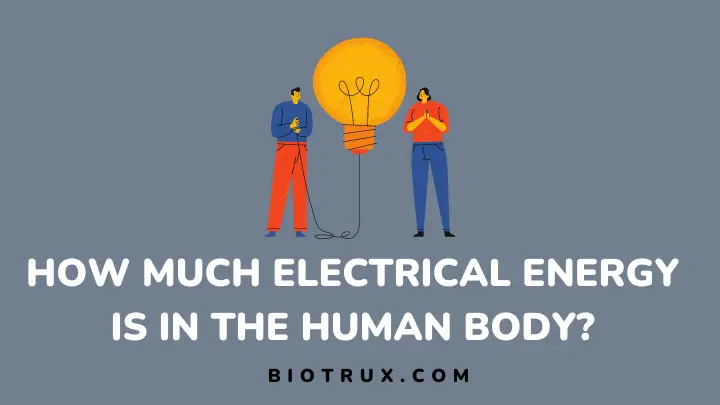The human body is a complex machine that boasts incredible functions. From breathing to thinking, our bodies are powered by energy – much of that energy comes from electricity. In fact, the human body generates electrical energy in a variety of ways. But how much electrical energy is actually in the human body?
It’s a fascinating question that scientists have studied for decades, and the answer might surprise you. It’s intriguing to consider the amount of electrical energy that powers our bodies and how it influences our everyday lives.
In this article, I will delve into the science behind electrical energy in the human body and explore how this energy impacts our health and well-being.
How Much Electrical Energy is In the Human Body?
The human body is a complex system of biochemical reactions and processes producing various energy forms. Electrical energy is one such form of energy in the human body.
The human body generates significant electrical energy necessary to function in various organs and systems. According to scientific estimates, the human body averages about 100 watts of electrical power.
This is equivalent to the energy produced by a small light bulb. The source of this energy is the activity of cells and tissues, which use chemical reactions to generate electrical potential across their membranes.
What is the Role of Electrical Energy In the Human Body?
The human body operates on a complex system of electrical impulses that coordinate everything from our heartbeat to our thoughts. Here are a few ways electrical energy plays a role in our body:
- The heart, brain, and nervous system rely on electrical impulses to function properly.
- Every time our heart beats, an electrocardiogram (ECG) can measure a small electrical current.
- Neurons in the brain use electrical signals to communicate with one another and control our thoughts, movements, and bodily functions.
- Even our muscles use electrical signals to contract and move.
Overall, electrical energy is a critical component of our body’s functions and helps to regulate many of the systems that keep us healthy.
How is Electrical Energy Produced In the Human Body?

The production of electrical energy in the human body is largely due to the activity of specialized cells called neurons. These cells use the movement of charged ions across their membranes to generate electrical signals known as action potentials.
These signals travel along nerve fibers to other cells in the body. The ions responsible for this electrical activity are mainly sodium, potassium, and calcium. In addition to neurons, muscles also play a role in generating electrical energy in the body.
When muscles contract, they use stored energy as ATP (adenosine triphosphate) to produce force. This process also generates electrical impulses that can be measured using electromyography (EMG).
Another important source of electrical energy in the body is the heart. A specialized group of cells in the sinoatrial node controls the heart’s rhythmic beating. These cells generate electrical impulses that spread through the heart and cause the muscles to contract coordinatedly.
This process, known as the cardiac cycle, can also be measured using electrocardiography (ECG). Overall, producing electrical energy in the human body is a complex and highly regulated process involving the interaction of various cells and tissues.
By understanding how these processes work, we can gain insights into various health issues, including heart disease, neurological disorders, and muscle dysfunction.
What is the Significance of Electrical Energy In the Human Body
The presence of electrical energy in the human body is of utmost significance. It is the driving force behind our ability to function and survive. Here are a few key points highlighting the importance of electrical energy:
- Nervous system: Electrical impulses transmit signals throughout the nervous system, allowing us to sense the world, control our movements, and process information.
- Health and well-being: Proper electrical activity in the body is vital for maintaining overall health and well-being. Disruptions in electrical signals can lead to various health conditions, such as neurological disorders, muscle disorders, and cardiac abnormalities.
- Diagnostic applications: Understanding the electrical activity in the body has paved the way for diagnostic techniques like electrocardiography (ECG) and electroencephalography (EEG). These tests measure and record electrical signals to assess the health and functioning of the heart and brain, respectively.
- Therapeutic possibilities: Harnessing electrical energy has opened doors to therapeutic possibilities. Techniques like transcutaneous electrical nerve stimulation (TENS) and deep brain stimulation (DBS) utilize electrical currents to relieve pain, manage neurological conditions, and improve quality of life.
Are There Ways to Use the Human Body to Generate Electricity?
Yes, there are ways to use the human body to generate electricity. This process is known as biomechanical energy harvesting. When we move, our muscles generate energy in the form of heat and kinetic energy.
This energy can be converted into electrical energy through piezoelectric materials. When subjected to pressure or vibration, these materials can produce a small amount of electricity.
Research has shown that biomechanical energy harvesting could power small electronic devices, such as wearable sensors and implantable medical devices. In one study, researchers found that walking could generate enough electricity to power a smartphone, although this would require many steps and specialized equipment.
Another approach to generating electricity from the human body involves using microbial fuel cells (MFCs). MFCs use bacteria to convert organic matter into electricity, and researchers have demonstrated that MFCs can generate electricity from human urine.
While this technology is still in the early stages of development, it has the potential to provide a sustainable source of power for remote or off-grid locations.
While there is still much research in this area, the potential applications of biomechanical energy harvesting and microbial fuel cells are exciting. As researchers continue to explore these technologies, it is possible to harness the power of our bodies to generate electricity in a sustainable and environmentally-friendly way.
FAQs
What type of electricity is in the human body?
The electricity in the human body is called bioelectricity. It is generated by the movement of ions across cell membranes and plays a crucial role in various bodily functions, such as nerve transmission and muscle contraction.
What happens if there is a disruption in electrical signals within the body?
Disruptions in electrical signals can lead to various health conditions, including neurological disorders, muscle dysfunction, and irregular heart rhythms.
Are there any practical applications of human electrical energy?
Yes. Electrocardiography (ECG), electroencephalography (EEG), and electrical stimulation therapies demonstrate practical applications of human electrical energy.
How does electrical energy affect our daily lives?
Electrical energy enables vital functions such as muscle movements, thoughts, and emotions, allowing us to perform daily activities and interact with our environment.
What is the safe voltage for the human body?
Voltages that are safe for human bodies depend on various factors, including duration, pathway, and individual susceptibility. In general, it is recognized that human bodies do not react adversely to voltages below 50 volts (V), especially when the current is limited.
Final Thoughts
In conclusion, it is fascinating to know that our bodies are not only complex systems of organs and tissues but also electrical. The human body generates and utilizes electricity constantly, from the nerve impulses that control our movements to the biochemical reactions that power our cells.
While the total amount of electrical energy in the human body is small, it is still a crucial force that keeps us alive and functioning. Understanding the body’s electrical properties can help us better appreciate our biology’s remarkable abilities and potential.
Furthermore, this knowledge can provide insight into developing new medical treatments and technologies that capitalize on the electrical properties of the human body.
It is an exciting time for research in this area, and we can only expect to learn more about the remarkable workings of our bodies in the years to come.
You can also learn more about the warning signs of electricity.
Thanks for reading.

